The current meltdown in markets has been caused by nothing being resolved from the 2007-2008 Great Financial Collapse and the GFC occurred because we forgot the lessons of 1929.
At 1pm on October 24th 1929, the vice president of the New York Stock Exchange, Richard Whitney marched onto the stock exchange floor after a morning of devastating losses and purchased well over the sale price in front of everyone $20million dollars worth of US Steel stock. He then went on to purchase General Electric, AT&T and other blue chip stocks spending $130million. His move funded by the wealthiest elites at the time was an attempt to insert confidence into a financial system on the verge of collapse. It worked. Until Monday 28th of October, four days later.
This attempted insertion of confidence by Whitney was misplaced and lacked macro economic foresight. Each panicked Government regulation response caused by Polanyi’s double movement brought about worse outcomes like the Smoot-Hawley Tariff Act until eventually global world war was the economic circuit breaker. The market demanded cuts in costs and thought of labour as merely another supply and demand graph, the political fallout for abandoning people to that terrible equation however demanded a political response.
Roosevelt’s election in 1933 saw laissez faire replaced as the dominant economic management ideology with Keynesianism. Capitalism adapted to the legitimacy threat with a social welfare state and unprecedented reform within banking, employment, agriculture and industry.
The lack of a new hegemony to replace the collapsing gold standard led to international relations theorists to suggest a hegemonic stability theory. Krasner argues that without one superpower to act as the lender of last resort or to maintain the international liberal economic system, the system falls over. The Bretton Woods conference was the reestablishment of that hegemonic stability with managed developmental capitalism at it’s heart before warping into what could be considered Hayek’s winning the war of position and last laugh at Keynes – the neo liberal Washington Consensus.
The debate since the Great Depression has been the cause. Was the lack of financial regulation prior to the crash the problem or was the political response to the Great Depression the problem.
The answer depends on who you listen to.
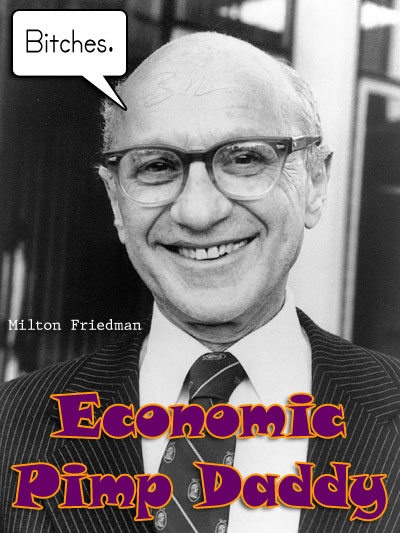
Milton Friedman argues from the neo liberal perspective that the moral imperative from Capitalism is it’s bust and boom dynamic, that those who profited from questionable market practices are punished when the bust occurs and that to deny a true bottom to a financial collapse is merely propping a corrupt system up which will eventually led to an even more damaging correction later in the future.
Fareed Zakaria however defends Keynes and argues that the recession is ultimately the product of a mismanaged financial sector and that Government had a responsibility to stabilize and re-regulate markets. So effective was Keynes’ ‘reformed capitalism’ that many Marxists were forced to reconsider their notions of crises. They argued that this new type of capitalism had to be re-evaluated. Instead of 10 year cycles, Marxists revisited long waves from the Russian economist Kondratieff. The seeds of the Great Recession however, were not the slow decline of booms made by product innovations, but the failures within deregulated neoliberalism.
So how does the Great Depression and the 2008 Great Recession compare? There are certain similarities, Liaquat Ahamed makes the point that the same hubris existed. In 1999 Time Magazine had on its cover Alan Greenspan, Robert Rubin and Lawrence Summers (Chairman of the Federal Reserve, Treasury secretary and deputy secretary) under an article called, ‘Committee to Save the World’. In the 1920s the same myopic view of a fiscal team who could save the global economy from the ravages of the First World War saw the press refer to Montagu Norman of the Bank of England, Hjalmar Schacht of the Reichsbank, Émile Moreau of the Banque de France and Benjamin Strong of the Federal Reserve Bank of New York as the ‘Most Exclusive Club in the world’. This belief in a small group of elites to oversee a deregulated global economy with little over all consideration for global impacts seems to be a set lesson that is repeated until learned.
If we directly compare economic and social indicators we see that in some ways the 2008 recession was in fact worse than the Great Depression. 1929’s average income in the US was $16,000, inflation-adjusted to today’s levels turns out to be just over $200,000. Even though Hoover managed to keep wage rates high for the first two years of the Depression, by 1932, with profits wiped out, the pressure on companies to pay their workers became too great and wage rates fell considerably, this was the double movement in effect.
World trade fell much faster in 2008 than during the Great Depression, however it is also falling from a much higher peak. Although it stabilised, this trend cannot be underrated given the prominence attached to trade destruction as a factor compounding the Great Depression in the academic literature.
So how did the 2007-8 crises occur? The growing debt of the US economy, the Federal Reserve’s unwillingness to regulate the financial market, and the rise in global inflation, particularly commodities and housing, all undermined the global economy. The bubble would inevitably burst, as it did in 1929. Leaders of the US congress were told on the 18th of September by the chairman of the Federal Reserve Ben Bernanke that the US economy was facing imminent collapse. The US housing market, with trillions of dollars worth of toxic debts turning bad, was at breaking point. In the spring of 08 investment bank Bear Sterns was rumoured to be in grave financial trouble due to its heavy investment in these toxic mortgages. This rumour turned out to be a self fulfilling prophecy and the company soon was facing collapse.
The Secretary of Treasury, Hank Paulson, forced commercial banks JP Morgan and Bear Sterns to merge in a 30-billion dollar venture which was in sharp contrast to his previously professed ideological standpoint as to the role of the state in the market.
Paulson’s line in the sand was that there would be no more bailouts. He urged Lehman Brothers CEO Dick Fold to find a buyer, however no one would actually buy the firm without a government bailout plan. Fold miscalculated that Paulson would allow the company to fail and ignored his advice. Days later the company went bankrupt: the government had allowed Dick to fold.
The unexpected aftermath of the Lehman Brothers bankruptcy was the crash of AIG. AIG had guaranteed Lehman Brothers full payout should the company go bankrupt, as no one expected a company that size to crash. As no one knew about the AIG situation, what ensued was the collapse of the world stock and credit markets. The fallacy of too big too fail sent shockwaves throughout the financial system.
So why is the current economic recession a worse crises of capitalism? Let’s take that some economic indicators of the current global recession have declined faster than the Great Depression, but comparison is difficult because the current recession has not yet played out. People who have built their careers on critiquing the Great Depression were in charge to change things this time around. Current head of the Federal Reserve, Ben Bernanke printed $1.2 Trillion to flood the global economy with stimulus money in the hope to stabilize markets and like a modern day Richard Whitney hopes to keep confidence in the economy. We can’t predict the future but acknowledging the inherent dangers involved in that strategy let’s argue beyond the statistics to suggest the current recession is a worse crises of capitalism because the legitimacy of the neo liberal model has been genuinely questioned.
The very fact that the international bodies set up to prevent another crises of capitalism by regulating the market before the boom busts is in itself evidence of a worse crises of capitalism. As former chief economist of the world bank and nobel prize winner, Joseph Stiglitz points out the proper name of the World Bank was the International Bank for Reconstruction and Development and the International Monetary Fund was charged with preventing another Great Depression. The drift away from their Keynesian principles towards the Free Market neo liberal influence of Friedman’s Chicago School of Economics has led to what Stiglitz calls, “global governance without global government”.
Interestingly Jurgen Habermas counter argues that ‘managed capitalism’ would actually collapse under the weight of it’s own restrictions. With the technical mastery of managed global capitalism, Habermas argued that a crisis of legitimacy would consume Governments constrained by their own regulations. These regulations made them unable to deliver what their citizens wanted, other than to encourage more debt and more consumption. The problem with Habermas’ critique of managed capitalism is that corporations and consumers needed no urging by Governments restricted by regulations to globally binge on debt fuelled consumer spending. We’ve seen this exact issue erupt in Greece.
It could be contended that the current crises of capitalism could be viewed more correctly as a failure of neo liberal capitalism. Naomi Klien provides a radical reinterpretation of neo liberalism that forces unpleasant truths about the implementation of neo liberal policy. She quotes Milton Friedman as proclaiming “Only a crises – actual or perceived – produces real change. When that crises occurs, the actions that are taken depend on the ideas that are lying around”. Friedman did all he could to make sure it was the Chicago School of Economics that just happened to be lying around when crises were created by the CIA in South America:
“I thought I was witnessing a fundamental change in the way the drive to “liberate” markets was advancing around the world. Having been part of the movement against ballooning corporate power that made its global debut in Seattle in 1999, I was accustomed to seeing business-friendly policies imposed through arm-twisting at WTO summits, or as the conditions attached to loans from the IMF. As I dug deeper into the history of how this market model had swept the globe, I discovered that the idea of exploiting crisis and disaster has been the modus operandi of Friedman’s movement from the very beginning – this fundamentalist form of capitalism has always needed disasters to advance. What was happening in Iraq and New Orleans was not a post-September 11 invention. Rather, these bold experiments in crisis exploitation were the culmination of three decades of strict adherence to the shock doctrine. Seen through the lens of this doctrine, the past 35 years look very different. Some of the most infamous human rights violations of this era, which have tended to be viewed as sadistic acts carried out by anti-democratic regimes, were in fact either committed with the intent of terrorising the public or actively harnessed to prepare the ground for radical free-market “reforms”.
The collusion between Friedman and repressive South American Dictatorships demands the question, what point of neo liberalism if it is merely the economic tool of Dictators? Beyond the fact that Friedman’s terribly traumatic free market policies actually produced worse economic results than the developmental approach that had been adopted in South America, how could an economic philosophy with freedom as its central theme produce such un-free states? Compounding Friedman’s theory as less than intuitionally ethical is Joel Bakan’s quote from Friedman in his book ‘The Corporation’:
Friedman thinks that corporations are good for society (and that too much government is bad). He recoils, however, at the idea that corporations should try to do good for society. “A corporation is the property of its stockholders, “he told me. “Its interests are the interests of its stockholders. Now, beyond that should it spend the stockholders’ money for purposes which it regards as socially responsible but which it cannot connect to its bottom line? The answer I would say is no”. There is but one “social responsibility” for corporate executives, Friedman believes: they must make as much money as possible for their shareholders, This is a moral imperative. Executives who choose social and environmental goals over profits – who try to act morally – are in fact, immoral.
The deregulation regime prescribed by Friedman set the deregulated global finance market that ushered in the current global recession. This Wild West of global finance was so abused by American Banking Corporates that Alan Greenspan famously conceded he didn’t understand the math behind some of the financial instruments used to proclaim sub-prime mortgage debt as AAA rated.
Neo-gramscians would argue that the neo liberalization of the IMF and the World Bank has seen political elites in various countries adopt neo liberal policies. These policies have contributed to the stock market crash of 2008, as unregulated banks took questionable financial practices global. Stiglitz saw the limitations of these neo liberal policies during the East Asian Financial Crisis when Asian countries were forced to deregulate.
Wallesteins World Systems theory, suggests that the economic collapse of core states will drag peripheral states into a deeper economic recession. Mass unemployment in core states will mean companies will not need to go international to find a labour force cheap enough to make production profitable. Peripheral states will find a sudden drop in investment, damaging their ability to grow. Unemployment created the drag in the Great Depression and our own Great Recession mirrors this reality as we go through the same post crash booms and false dawns the Great Depression went through before it’s W shaped rescission was compounded by the inevitable double movement between market correction and social demands.
The economic and social fallout caused by the Great Depression fostered fascist and communist threats to the capitalist world order. These ideologies were seen as real alternatives to the mass unemployment and economic damage caused by the Great Depression. Fascist and Communist movements were nationalistic in nature and caused the descent into world war.
The unequal distribution of wealth and unregulated greed of modern capitalism, symbolized by the Great Recession, has similarly fostered groups which challenge capitalism. This time it has come from trans-national movements like Al Qaeda, and anti-Globalization protestors rather than national ones. The recent rise of the BNP in England has increased as the effects of the Great Recession have punished Britain’s finance sector that now accounts for 20% of the country’s GDP while $140 billion in bonuses for bankers who continue to write up questionable deals with the full backing of the taxpayer creates class resentment that can fuel extremism.
The differences between these two threats indicate how the definition of ‘crisis of capitalism’ has evolved in the shadow of the Great Depression. Fascism and Communism held pretentions to be the new global hegemony. Transnational challengers however, seek to modify or limit Globalized Capitalism rather than replace it.
As the planet struggles to reign in an industry that globally accounts for over $300 Trillion per year in the financial economy as opposed to the $8 Trillion created by the real economy, this obvious power imbalance gives some hint to the difficulty capitalism has to evolve beyond the influence of those wealthy enough to write the rules. Without the type of social pressure a W recession could enforce upon capitalism to evolve, neo-grasmcian counter hegemonic movements will have limited success for co-opting the leavers of power for internal change. The danger of wishing for the W recession is that the same fuel to create social change can be the same source of fuel for extremism.
The Great Recession of 2008 is a worse crises of capitalism than the Great Depression because the managed capitalism that was supposed to protect us from the cruel boom and bust mechanics have been replaced by the very deregulated wild west free market approach which led us to the 1929 collapse. The Great Recession is a failure of neo liberalism, but the additional problem for the Great Recession is that it is taking place within an environment that simply can not sustain the extra pressure consumer culture and unregulated growth has placed upon the biosphere.
The ‘solution’ to the Great Recession of the 2007-2008 has been printing money with zero interest, this has managed to kick the can down the road for America, it’s imploded Greece and the half a Trillion China poured into it’s economy have resulted in the obscene meltdown we are seeing now…
Fear China’s stock-market earthquake
Here’s the chilling thing. What’s going on in China is madly redolent of the 1929 Wall Street crash.Here’s why.
The 150% rise over a year in the Shanghai Composite Index to its mid-June peak was largely driven by investors borrowing to buy shares, or margin trading in the jargon, just as happened in the US during the Roaring Twenties.
And the subsequent self-reinforcing collapse has been driven by China’s indebted investors being forced to sell shares to meet their debts.
As for the economic significance of what is going on, well these very big stock markets in Shanghai and Shenzhen are no longer serving their core purpose of supplying equity capital to businesses – which will have a significant negative impact on Chinese growth.
The despicable injustice of the wealthy elites looking after their greed is best summed up here…
A crisis should never be wasted, the question will be who exploits it first? Tobin taxes, taking happiness into account, redesigning the very masculine dominated growth measurements and a developmental rather than neo liberal approach on the one hand or the increased consolidation of power into the hands of a corporate elite on the other.
The latter isn’t working and a TPPA ‘free trade’ deal with America is no solution.

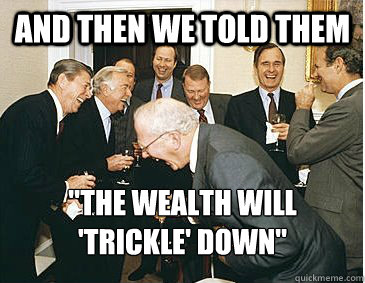
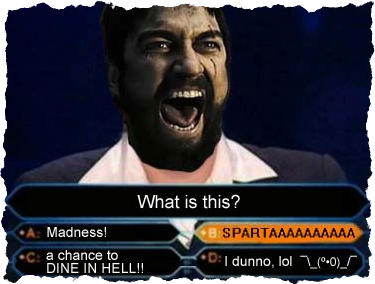
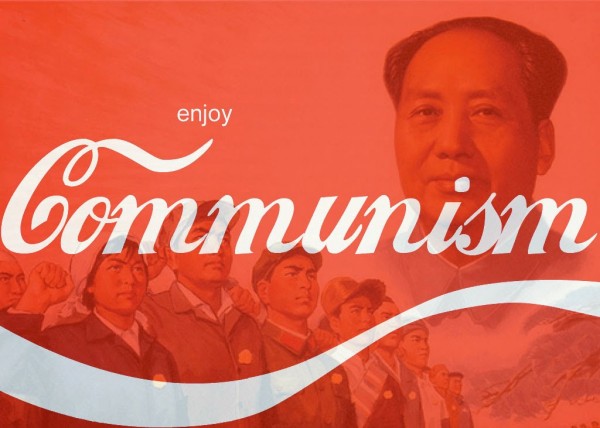
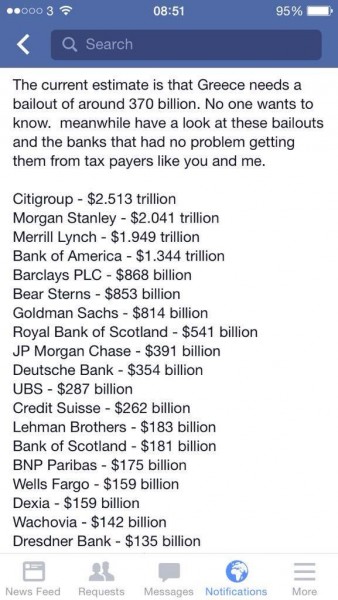
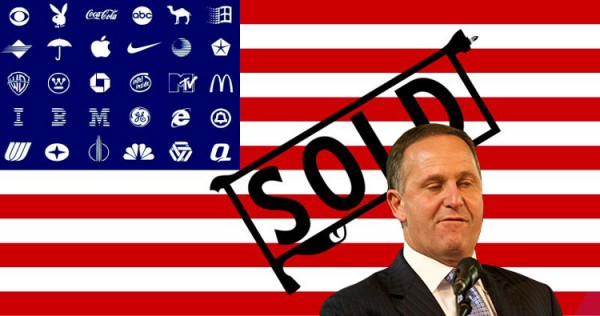




The Great Recession is currently morphing into The Greater Depression; before our very eyes.
Have a look at:’ Swiss Institute of Technology investigation into Global Banking”.
Even Bill Gates talks openly about a One World Order.
I believe these manipulators will not be the victors.
I have rider to the above: “Nesara” is the ultimate goal. Question is: will it be run by the benevolent for the good of all mankind, or, by the malevolent few (whose actions can be easily traced through wars, sudden economic downturns and depression). My bet is still that the “goodies” will be victorious.
(A warning to those involved with the malevolent: Oft times the spider eats its own.)
Re above rider – Please insert the word:
“stopped” after the word or, and before the words “by the malevolent few”.
Thanks
This is a meltdown….three stops due to “technical issues” in one day for the NYSE.
Other temporary website shutdowns for the WSJ, Zerohedge, plus Delta Airlines grounded due to computer issues – all four occurred today but not a damn thing on Stuff or Herald frontpage.
http://www.zerohedge.com/news/2015-07-08/historic-nyse-halt-post-mortem-shock-and-awe-when-it-all-went-down
‘Nothing to see here in NZ’ only reporting we get is ‘look its snowing’ – well it is winter after all.
I don’t pretend to understand it all, but even I know there is something disturbing about borrowing large sums of money to gamble on the stock exchange. The same greed and bullishness keeps happening time and time again. When will people learn that prices cannot go up forever.
We are probably into the next, and even final, Great Depression.
Since the early 20th century capitalism has been more destructive of the accumulated wealth of humanity than it as created new wealth.
It needed depressions and wars to destroy material wealth and nature to survive. Each time it destroys more to survive and now approaches total destruction.
Whatever social gains capitalism made possible in freeing workers from slavery and feudalism, and in developing our material wealth, these gains have been incidental to the exploitation and oppression of humanity and nature for private gain.
The cost has been terrible and now threatens to destroy us forever.
The increasing tension between the two big blocs of imperialist powers led by the US and China are already causes many proxy wars any of which can break out into a spiralling Third World War.
Capitalism can only survive by killing us. For us to survive we have to kill capitalism.
Our first task is to decommission the Nuclear plants which as climate change impacts will meltdown. There is no coming back from that event.
The Germans and Japanese are leading the way.
The second is to remove from power the global capitalist ruling class that will sacrifice humanity and nature before they give up their wealth and power.
We can all do this locally, nationally and internationally.
Our best hope is that the Chinese meltdown which will come sooner or later can activate its working class as the shock troops of the billions of workers in the world who must put a stop to the destruction of our civilisation and the nature of which we are a part.
Goldman Sachs & the Destruction of Greece & the world.
They are the bandits that no one had the guts or power to go after Goldman Sachs before in 2008.
They are very powerful untouchable in fact so they need to be taken apart using the military.
Not politicians, as they are bought and weak, as we see here.
https://www.youtube.com/watch?v=V2SyP6rmJ1Y
Goldman Sachs (read Rothshilds) have had the Military Heads and Nato sitting in their pockets for years. The info is sitting on the web.
a book may be relevant to quote here.. I am currently reading ‘When the Money Runs Out’ by Stephen D. King.. subtitled ‘the end of western affluence’.. lots to ponder.
The housing crisis; the energy crisis; the jobs crisis; these are all symptoms.. the underlying cause? assholes…
Brilliant article thank you
Comments are closed.